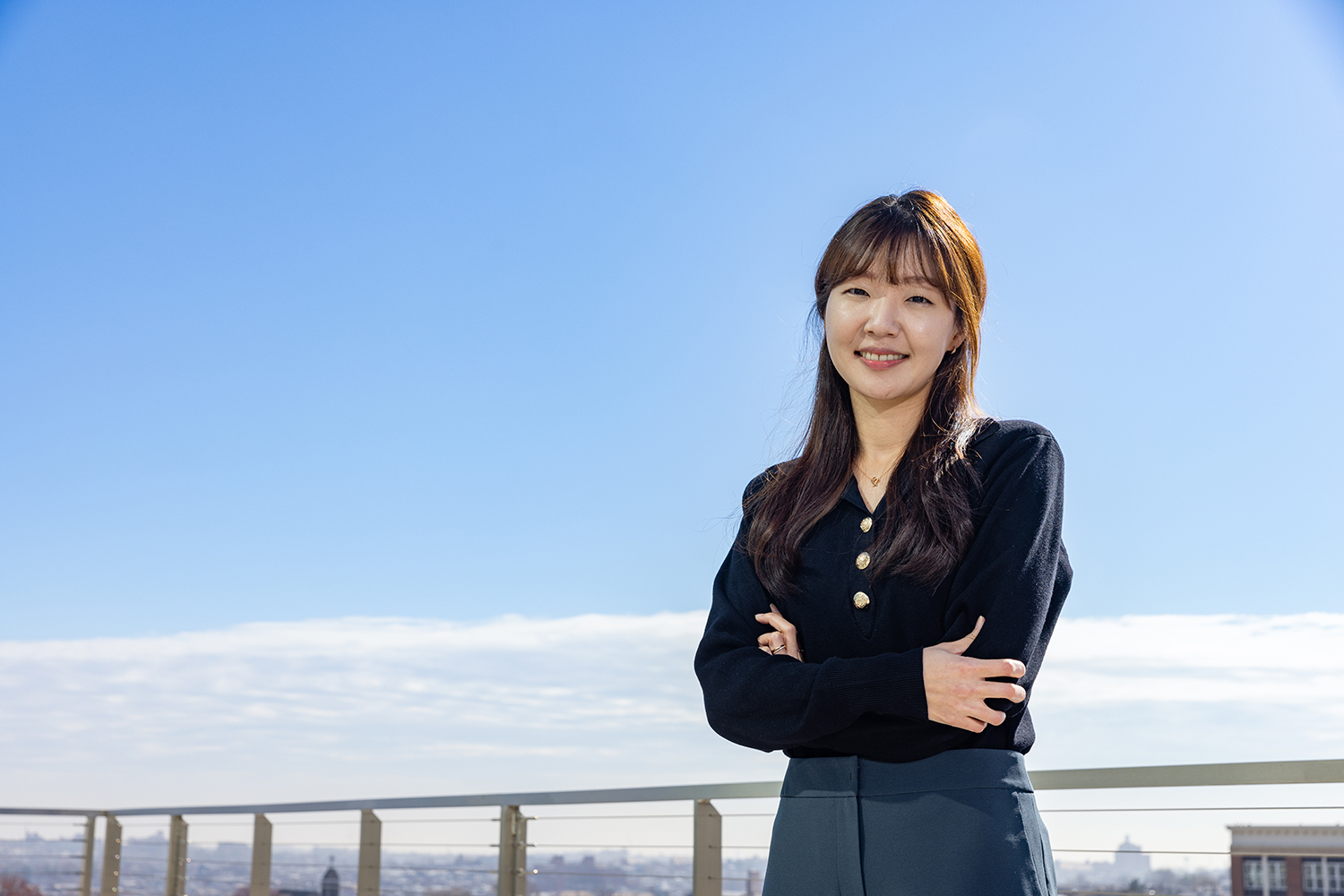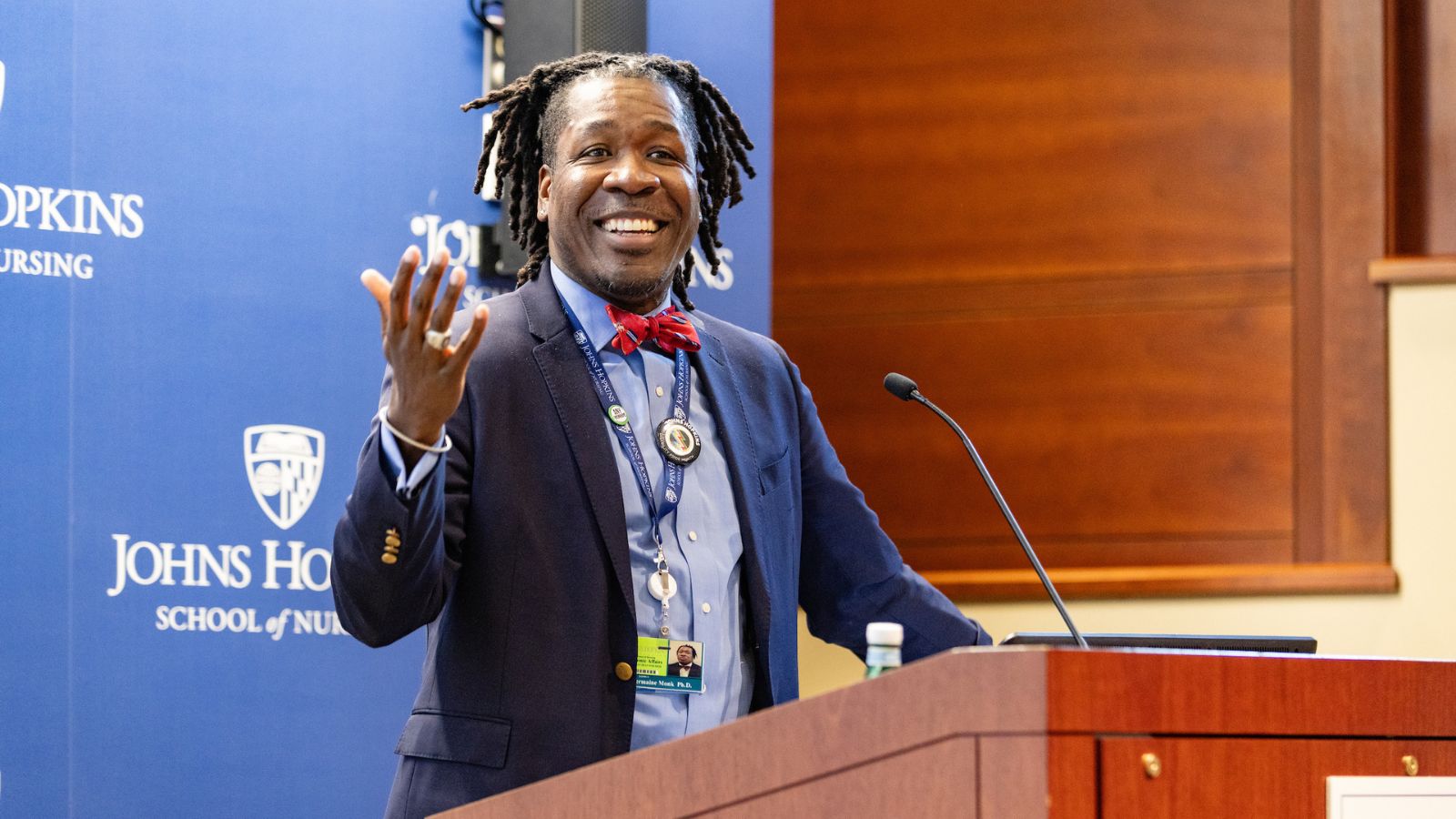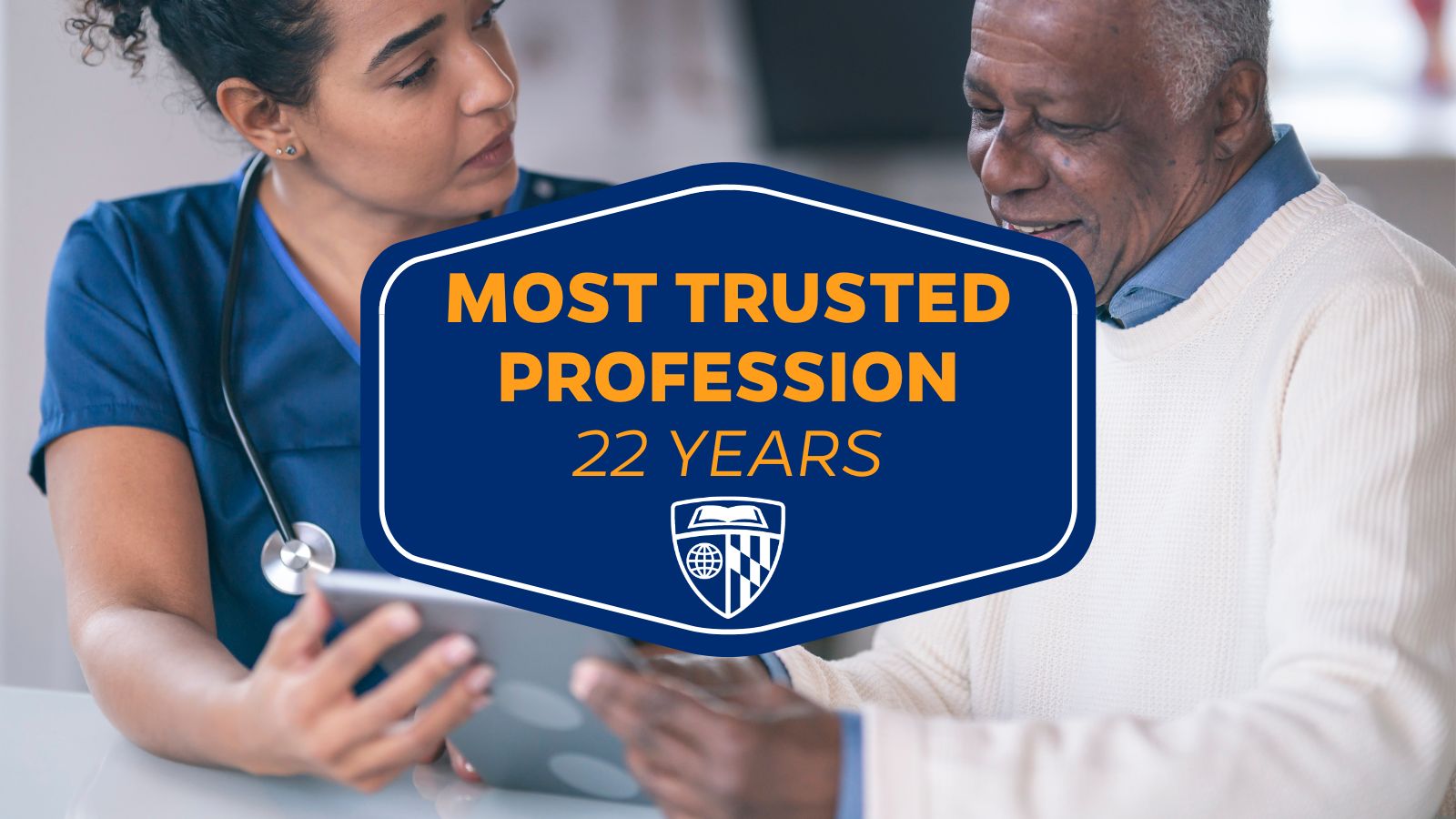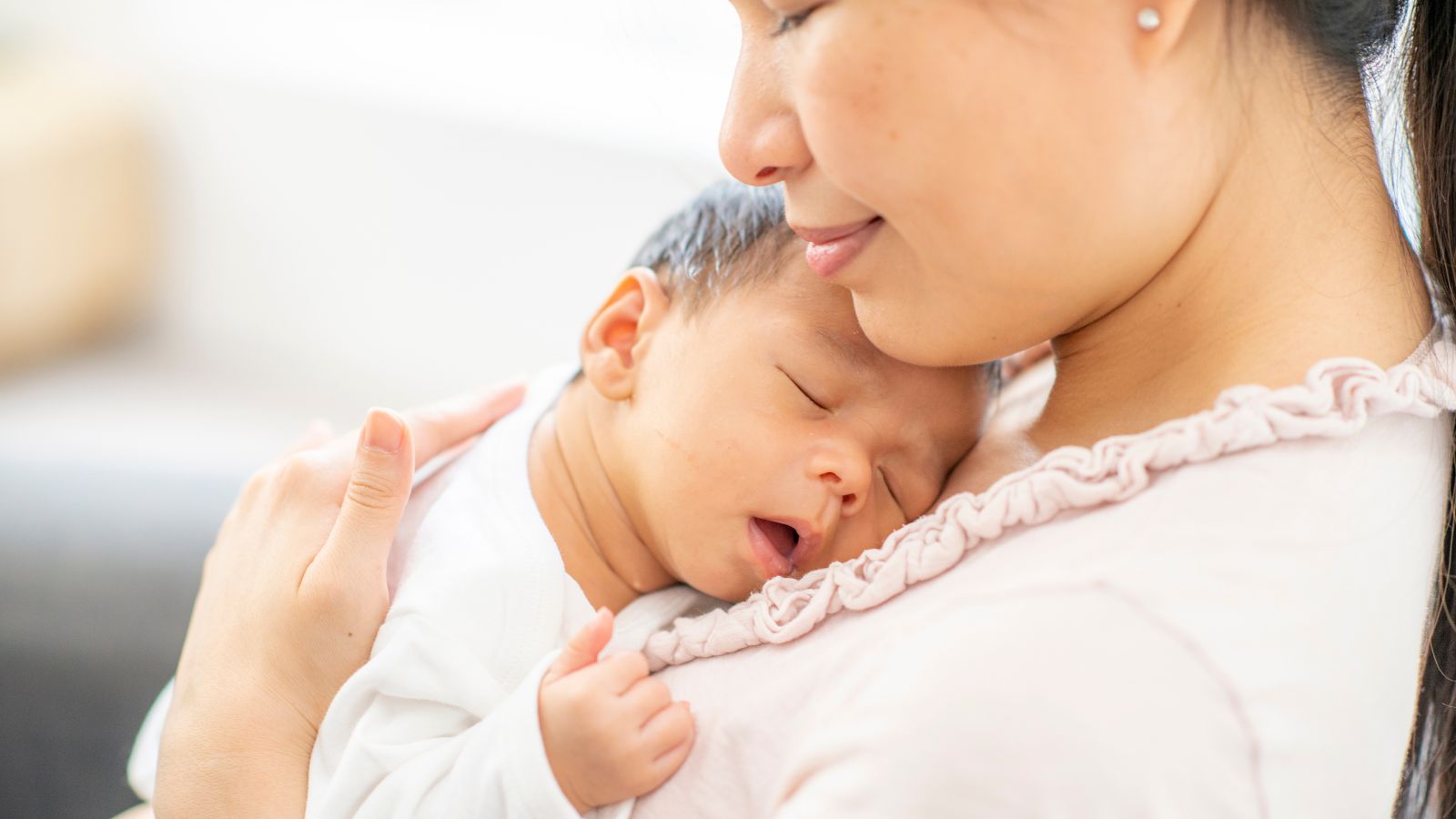Veronica Lee took a leap of faith into the U.S. and Johns Hopkins. She wouldn’t hesitate to do it again.
Veronica Lee could have simply stayed home in South Korea. She’d graduated from Ewha Womans University in Seoul, her hometown, and already earned a Future Nursing Leader Award from the Global Korean Nursing Foundation. An admitted home-body, Lee insists that she gets much of her energy from being in cozy surroundings. Yet there she was, free-falling out of an airplane somewhere high above Australia, then a couple of months later parachuting solo into a new career and life in the United States.
“I had no family, friends, or cousins who were living in the United States. It was just me. I don’t know how I did it at that time. I was brave,” Lee explains of her big move in 2018. “But I know that the decision to be here in the U.S. turned out to be one of the best choices and changed everything in my life.”
If her mother in Seoul wanted to, she could easily say, “I told you so.”
“My mom always told me, ‘You have to go out and meet people.’ ” The message has stuck, with a few helpful reminders: “I engraved on my AirPods, ‘Go out and do something.’ I always kind of push myself to go out and look around.”
Since before landing in the U.S., Lee has served as a rehabilitation nurse to stroke patients and those with spinal cord injury or coming off orthopedic surgery, and has noticed a clear difference in the prescription of opioids here, where misuse has helped fuel an addiction crisis. Pain medications—including opioids—are of course not bad in and of themselves. With proper use, education, and understanding among patients and caregivers alike, they can be an important tool in pain management.
So, upon joining the family nurse practitioner track at the Johns Hopkins School of Nursing in 2019, Lee’s Doctor of Nursing Practice scholar project has involved a focus on implementing a pain education program for patients discharged after orthopedic surgery. Her project focuses on educating patients on risks and side effects of opioids as well as possible benefits of alternatives like non-opioid analgesics and non-pharmacological methods. She seeks ways to educate them on the proper use of opioids after discharge, where without the controls of inpatient care, “Their pain management falls apart” and the risk of misuse or addiction grows.
She says, “Being able to self-manage pain is an essential part of recovery after surgery. To do so, patients need to enhance their knowledge and confidence in managing pain. Although patient education is a fundamental component of perioperative management, pain education practices remain inconsistent and incomplete in the hospital setting. And this puts patients at risk for developing uncontrolled postoperative pain and negative health outcomes associated with it.”
She has come to understand the stigma that addiction carries in America and the disparities faced by pain sufferers based on social determinants, having navigated enough cultural challenges as an English-as-a-second-language immigrant. (Lee’s given name is Yoon-Jae, but for ease in her adopted country she goes by her Catholic first name. And she has clearly mastered English, despite pre-interview apologies for any mispronunciations.)
“That experience of coming to the U.S. has really broadened my perspective,” Lee explains, pointing proudly toward the final stanza of the 1915 Robert Frost poem The Road Not Taken:
I shall be telling this with a sigh
Somewhere ages and ages hence:
Two roads diverged in a wood, and I—
I took the one less traveled by,
And that has made all the difference.
“It was not an easy decision for me to live in a completely different country and culture. And of course the language. I think the fact that I took ‘the one less traveled by,’ that has really made all the differences in my life.”
As for goals as she looks to graduation in Spring 2023 and beyond: “I aspire to be part of the next generation of nursing leaders, clinicians, and researchers working not only toward advancing pain management but also addressing disparities in pain as well.”
“I think the fact that I took ‘the one less traveled by,’ that has really made all the differences in my life.”
Doing so will mean addressing not only the stigmas carried by patients but those harbored by caregivers who could benefit from further education on pain and pain management themselves. The rest may come down to empathy, getting to know patients, and recognizing that everyone feels pain differently. Though “we have all lived with pain,” Lee explains that nurses often have never experienced the acute levels faced by patients after orthopedic surgery or serious injury.
In her case it isn’t for lack of trying. A fearless adventurer and world traveler, cites Australia as a favorite spot for its weather, jet skiing, and yes, skydiving. She has no plans to stop seeking adventure, especially jet skiing, which she’s found is just as pleasurable here in Maryland.

Lee has also thrown herself into community engagement through Johns Hopkins’ natural ties to its surrounding neighborhoods, through the COMPASS Center (above), as a community fellow, and as a volunteer (providing drive-up free flu vaccinations for the community, for instance). If she’s missed any opportunities, again, it hasn’t been for lack of trying. “For me, the studying is not the only reason for being a Johns Hopkins student.”
And she’s determined to keep going out and doing things as a nurse leader.
“When I look back at my past three years, I can tell you how much I have grown up as a nurse: as a clinician, as a scholar, and as a future leader,” she says.
Look out below.
Read more profiles from the “We Are All East Baltimore” series.

 Forging Policy: How Can Doulas Improve Black Maternal Health?
Forging Policy: How Can Doulas Improve Black Maternal Health? You’re Welcome
You’re Welcome Forging Policy: Associate Dean Jermaine Monk and Education After Affirmative Action
Forging Policy: Associate Dean Jermaine Monk and Education After Affirmative Action Nursing Named Most Trusted Profession for 22nd Consecutive Year
Nursing Named Most Trusted Profession for 22nd Consecutive Year Most People Want to Breastfeed, But Need More Support To Do So
Most People Want to Breastfeed, But Need More Support To Do So






